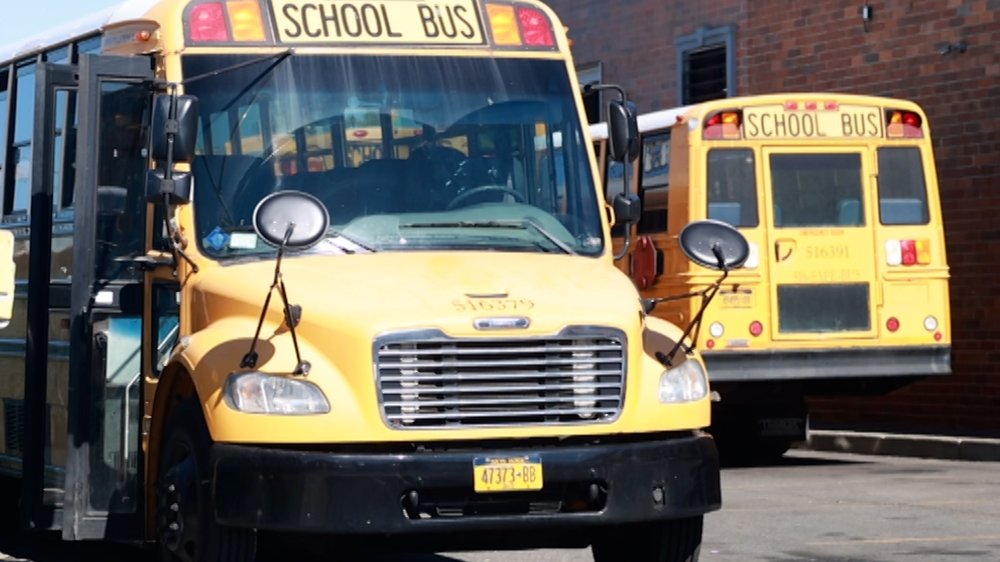Fearing a strike, NYC parents push for bus driver labor protections
Feb. 27, 2025, 11 a.m.
Depending who you ask, the seniority measure for drivers either helps maintain the workforce or perpetuates dysfunctional service.

A fight is brewing in Albany over a little-known seniority provision for drivers in New York City’s troubled school bus system ahead of contracts expiring this summer.
The Employee Protection Provision, or EPP, preserves school bus drivers’ wages and benefits by prioritizing current drivers in hiring and new routes. State Sen. Robert Jackson, who represents parts of Uptown Manhattan and the Bronx, introduced a bill in January to make those protections into law.
On one side is the main bus drivers' union and its backers, who fear that ending the provision would result in a strike and disrupt service for some 150,000 students. On the other side are fiscal watchdogs who argue the provision drives up the cost of the $1.9 billion school bus system.
“The bill has faced an uphill battle,” said Johanna Garcia, chief of staff to Jackson, who introduces the legislation every session. “At the end of the day the EPP is needed for safe, timely, reliable bus service.”
The city’s school bus service is routinely denounced as dysfunctional, particularly during the first few weeks of a new school year. Tales of students waiting for hours for the bus to show up are common. Other times the bus doesn’t show up at all. Disabled students who must travel to special education schools far away typically suffer the most.
“Every year it’s some different issue,” said Rima Izquierdo, a member of Parents to Improve School Transportation, or PIST, and mother of two kids who are supposed to ride the school bus. “September is terrible. There are regularly kids with no routes. The routes are too long… You never know what you’re going to get.”
Sometimes her son, who needs a paraprofessional on the bus, doesn’t have one, she said. Other times, bus rides extend to almost two hours, double the anticipated length of the trip.
She said the seniority provision would help attract new drivers who could serve new routes, or be backups when other drivers calls out sick.
But Izquierdo also acknowledged that she fears a bus driver strike.
“We can’t bid new contracts because bidding without the EPP will result in a strike,” she said.
In 1979, bus drivers went on strike amid a debate about whether to include similar driver protections in new contracts. Kids were taken to and from school by corrections officers driving vans from Rikers Island. In 2013, Mayor Michael Bloomberg tried to rebid school bus driver contracts without the labor provision, saying the cost was exorbitant, leading to another strike that stranded more than 100,000 students. Former Gov. Andrew Cuomo vetoed legislation enshrining the provision in law twice, saying it was too costly and anticompetitive.
Many of the school bus contracts are expiring this summer, reviving the Employee Protection Provision debate. Absent legislation guaranteeing the employee protection, the city has just been extending old contracts, some going back as many as 45 years.
The main bus drivers' union, Amalgamated Transit Union Local 1181, said the labor protections are essential for recruiting and maintaining workers amid nationwide driver shortages.
“It helps keep experienced, dedicated professionals that safely transport and attend to the most precious cargo — the children!“ Carolyn Rinaldi, chief of staff at ATU 1181, said in an email. She said she was in Albany with union members lobbying for the bill on Tuesday.
The city education department backs Jackson’s bill.
“This legislation would ensure that New York City’s hardworking school bus drivers and attendants can maintain their EPPs, while allowing us to update our school transportation contracting system to ensure that our students with transportation needs are supported,” education department spokesperson Jenna Lyle said. “We hope that this bill is signed into law this legislative session.”
But critics say the labor provision drives up costs by requiring companies to keep the most senior, highest-paid drivers on the payroll.
The costs of transportation of public school students increased by $360 million, or 26%, between the fiscal years that ended in 2019 and 2024, according to Ana Champeny, vice president of research at the Citizens Budget Commission.
“Rebidding these contracts — most of which have not been rebid in decades — without employee protections is needed to rein in cost growth and improve service,” Champeny said.
The four largest school bus companies did not respond to inquiries. A representative of one large operator, Jofaz Transportation, said “no comment” and hung up.
"The city has identified the EPP bill as a necessary step before rebidding the bus contracts, allowing it to continue current bus worker protections in new contracts," said Randi Levine, policy director at Advocates for Children. "Given the frustrations we hear year after year from family after family, the state and city must urgently take all steps needed to create a transportation system that works for students and families."
Avi Small, a spokesperson for Gov. Kathy Hochul, said she would review all legislation that passes both chambers.
School bus service is already rough in NYC. It could get worse.